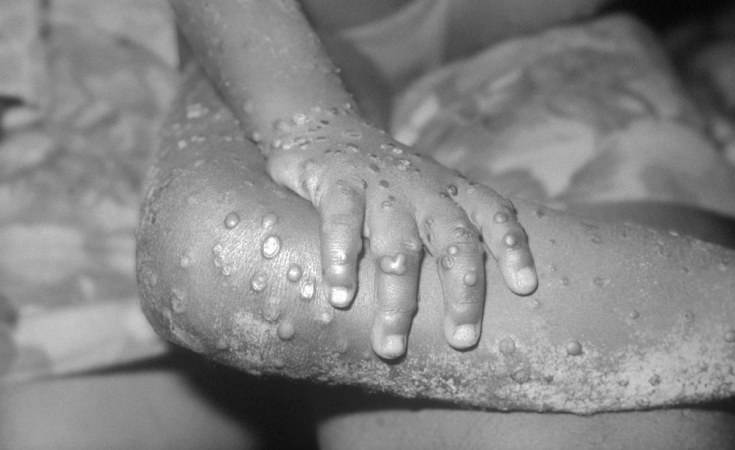The spokesperson for Madrid's regional health department revealed that the suspected cases were confirmed in gay men through fluids.
Barely two weeks after the government of the United Kingdom confirmed Monkeypox in an unidentified individual who travelled from Nigeria, health authorities in Spain issued an alert over a possible outbreak of the viral infection in the country.
The Spanish health ministry said eight suspected cases of the infection have been discovered in the Madrid region after eight men showed symptoms compatible with the infection, the Guardian reports.
It added that while the suspected cases are being analysed by the National Microbiology Centre to obtain a definitive diagnosis, a nationwide alert had been issued "to guarantee a swift, coordinated and timely response."
Meanwhile, five cases have also been detected in Portugal with 15 cases still under investigation, while the UK has six other cases apart from the first person with travel history to Nigeria.
Nigeria makes clarification
But the Nigerian government has insisted that there is no Monkeypox outbreak in the country.
It, however, noted that between 2017 and 2022, spanning five years, a total of 558 cases and eight deaths had been recorded.
The Nigeria Centre for Disease Control (NCDC) in its recent update said it could not confirm the authenticity of the claim that the said traveller truly contracted the infection in Nigeria.
NCDC said: "On 7th May 2022, the NCDC was notified by the UK International Health Regulations (IHR) national focal point of a case of Monkeypox detected in a patient with recent travel history to Nigeria. The individual is a UK resident who arrived in Nigeria on 20th April 2022, travelled to Lagos and Delta States during the time spent in Nigeria, departed Lagos on 3rd May 2022 and arrived in the UK on 4th May 2022.
"While in Nigeria, the case did not report being in contact with anyone with symptoms of Monkeypox or other illness with rash. The diagnosis of Monkeypox (West African clade) was confirmed by PCR in the UK on 6th May 2022. The patient is currently stable and receiving care in the UK."
The disease control centre, however, said it was investigating the incident in collaboration with the Lagos and Delta States' ministries of health.
"In addition, the Monkeypox Technical Working Group comprising the Federal Ministry of Agriculture and Rural Development (FMARD), World Health Organisation (WHO), United Nations Children's Fund (UNICEF), US Centres for Disease Control (US CDC) and coordinated by the NCDC is collaborating to strengthen in-country capacity to prevent, detect and respond to monkeypox cases in the country," NCDC added.
NCDC, however, confirmed that "since the re-emergence of Monkeypox in Nigeria in September 2017, the country has continued to record sporadic cases of the disease from states across the country."
In 2022 alone, the disease centre said 15 cases have been confirmed but insisted that the figure "does NOT constitute an outbreak."
It said the highest number of cases has been reported from the country's South-south region.
Suspected cases in Spain
The spokesperson for Madrid's regional health department revealed that the suspected cases were confirmed in gay men through fluids.
"Generally speaking, monkeypox is spread by respiratory transmission, but the characteristics of the eight suspected cases point towards fluid contact,
"The eight suspected cases in Madrid are among men who have sex with men. They are doing well but this illness can require hospital treatment."
Fernando Simón, an epidemiologist who heads Spain's health emergencies centre, said while it was unlikely that Monkeypox would spread significantly, "that can't be ruled out".
Ulcerative lesions
The Guardian newspaper also reported that Portugal's health ministry said the cases which were detected in the Lisbon and Tagus Valley region, involved men whose symptoms included ulcerative lesions.
"The UK has reported similar cases of ulcerative lesions, with confirmed Monkeypox virus infection," it said, adding that "We are monitoring the situation at the national level and in conjunction with European institutions."
Also, the UK Health Security Agency said four of the most recent cases are men who identify as gay or bisexual or other men who have sex with men.
The health body is asking these groups "to be alert" to possible symptoms, which include rashes or lesions on any part of their body, especially their genitalia, and to contact a sexual health service if they have concerns.
More on the infection
The director of clinical and emerging infections in UKHSA, Colin Brown, explained that Monkeypox is a rare viral infection that does not spread easily among people.
Mr Brown said it is usually a mild self-limiting illness and most people recover within a few weeks.
He, however, noted that severe illness can occur in some individuals.
He said: "The infection can be spread when someone is in close contact with an infected person; however, there is a very low risk of transmission to the general population.
"The initial symptoms include fever, headache, muscle aches, backache, swollen lymph nodes, chills, and exhaustion. A rash can develop, often beginning on the face, and then spreading to other parts of the body. The rash changes and goes through different stages before finally forming a scab, which later falls off."
About Monkeypox
According to the Centre for Disease Control and Prevention (CDC), Monkeypox was first discovered in 1958 when two outbreaks of a pox-like disease occurred in colonies of monkeys kept for research, hence the name 'Monkeypox.'
The first human case of Monkeypox was recorded in 1970 in the Democratic Republic of Congo (DRC) during a period of intensified effort to eliminate smallpox.
Since then, Monkeypox has been reported in people in several other central and western African countries: Cameroon, Central African Republic, Côte d'Ivoire, the Democratic Republic of the Congo, Gabon, Liberia, Nigeria, Republic of the Congo, and Sierra Leone.


